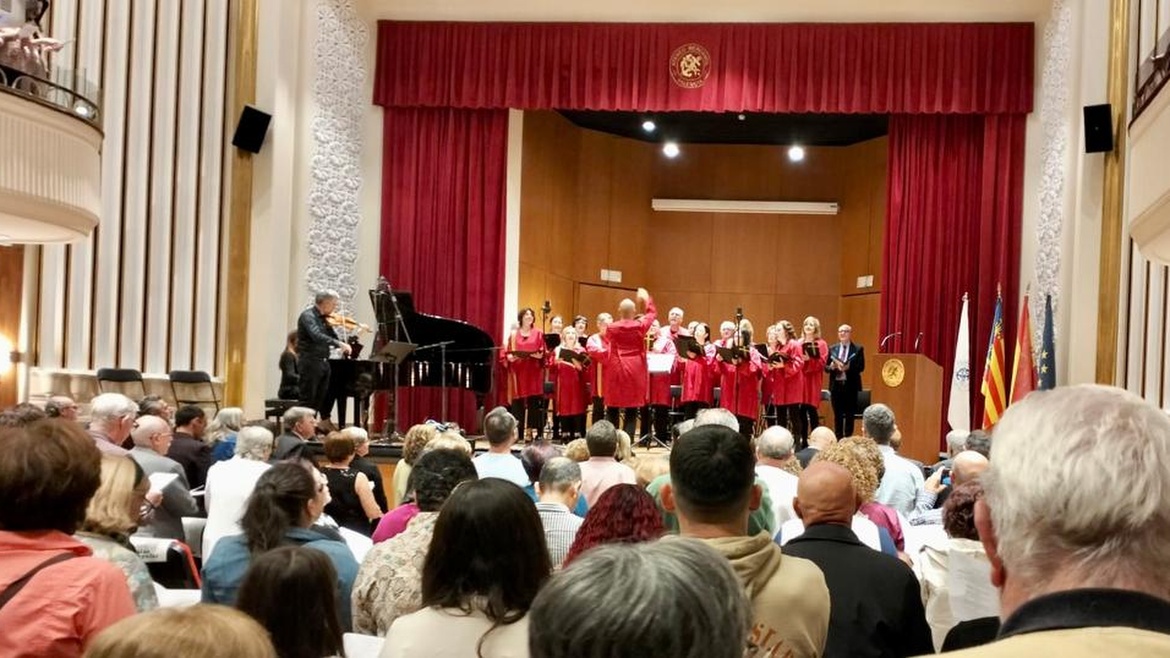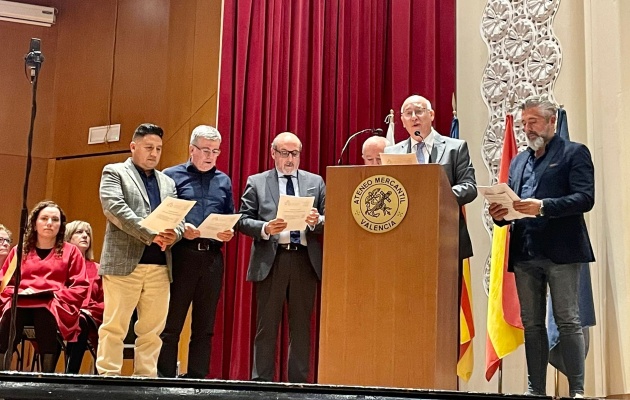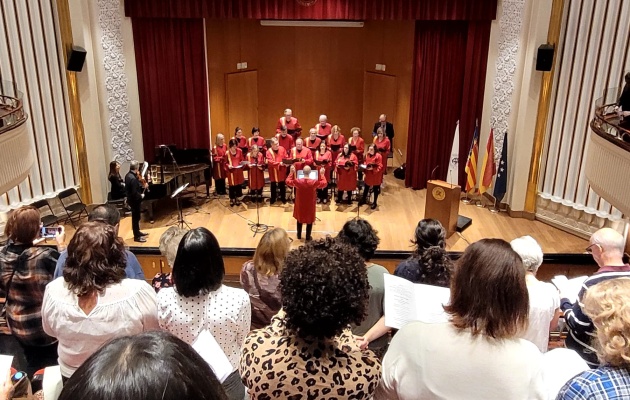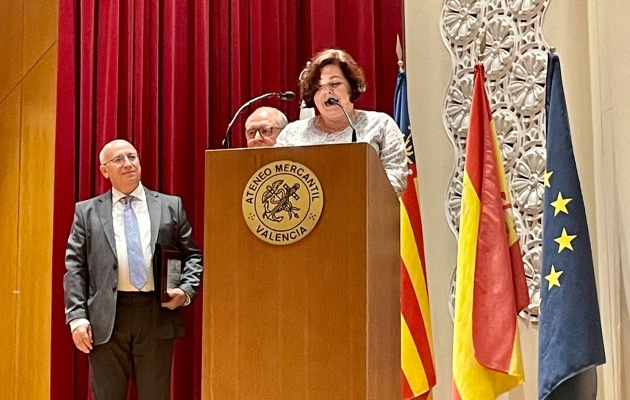“The Protestant Reformation is not a point of arrival, but rather a point of departure”
Valencia fills the Ateneo Mercantil to celebrate the Protestant Reformation. Conducted in Valencian and Spanish, the event was broadcast for the first time by the regional public television.
VALENCIA · 02 NOVEMBER 2023 · 17:38 CET

Nearly 500 people from all over the Alicante, Castellón and Valencia regions came to Valencia’s Town Hall Square to celebrate Protestant Reformation Day, filling the auditorium of the city’s historic Ateneo Mercantil auditorium to the last seat.
The formal but dynamic event included prayers, readings and an awards ceremony, in which some fifteen people from various evangelical denominations took part. The music was provided by the choir of the Baptist Church of Quart street.
The centrality of the Word was shown in practice with readings from the Bible (Romans 5:1-5, Psalm 46, Philippians 2:10-11) and songs to which the audience joined in, such as “This is what I believe” or “Déu és l'auxili, un ferm castell” (Martin Luther’s “A mighty Fotress is our God”, in Valencian language).

Leaders of the Evangelical Council of the Valencian Community and local pastors' fraternities read a prayer of blessing for the region. “Today, 506 years later, we reaffirm the 5 basic principles of the Reformation”, read the manifesto in Valencian language printed in the programme handed out to the audience on arrival at the venue, which explained the principles of Sola Scriptura, Solus Christus, Sola Gratia, Sola Fide and Soli Deo Gloria.
The event combined the spiritual focus of a regular evangelical worship service with the formality of a public event. Among the guests who attended were, among others, the Minister of Justice and Interior of the Valencian Community government, Elisa Núñez, the director of the Department of Philosophy of the University of Valencia, Francisco Arenas, and representatives of the Catholic, Adventist and Islamic communities.
The event was organised by the Evangelical Council of the Valencian Community (CECVA) and had the incentive of being the first to be broadcast on Á Punt television. Cameras from this public regional broadcaster streamed the entire event, although only online, not as part of the general programming on traditional television.

A musical moment of the Reform Day event in Valencia, seen from the mezzanine floor. The power of the Word in the form of music
The historian and pastor Pau Grau was in charge of the central message, which revolved around Martin Luther’s vision as a translator and musician. He was a pioneer of congregational hymnology because “he intuited that music, accompanied by good lyrics, especially when it meditates on the Scriptures, has a power of transmission and survival that transcends the centuries”, said Grau. The German Reformer’s aim was to “permeate everyday life with the Word of God, without sacramental mediation”.
Psalm 46, which would inspire Luther’s most famous hymn, “reminds us of something we must not forget: that God’s work is not ours, that everything we are and have will pass away, that only the Kingdom of God will remain, and that in the meantime, his Spirit will guide and sustain us”.
The preacher emphasised that “Reformed thinking shifted the emphasis from the Eucharistic mystery to the rediscovery of the Word of God, the Bible”. This “not to understand Scripture as a set of norms, rules of conduct or doctrines, but as something living, God himself acting and redeeming, especially through the incarnate Word, the ultimate and definitive Word of God for our salvation”.
The Protestant Reformation of the 16th century “is not a point of arrival, but rather a point of departure”, and should be a call “to go out of our four walls to salt and enlighten the world, working for the dignity of every human being and especially for the weak, the oppressed and the marginalised”, he argued.
El acto termina con la canción La Bendición, que cantan todos los asistentes. Esto es de las cosas que define a los evangélicos: cualquier canción interpretada desde el frente se convierte automáticamente en congregacional. pic.twitter.com/1b3hBPSmMJ— Joel Forster (@joelfwal) October 31, 2023
Religious freedom and Gaspar de Centelles
Previously, the Gaspar de Centelles Awards for the defence of religious freedom had been presented to Elisabet Pérez for her pioneering work in the implementation of Evangelical Religious Education in the region’s schools, to José Martí for promoting relations between different evangelical institutions, and to Peruvian missiologist residing in Valencia, Samuel Escobar, for his life of Christian ministry. For health reasons, the latter two were unable to attend in person.

Elisabet Pérez accepting the Gaspar de Centelles Prize 2023. Gaspar de Centelles was “an illustrious Valencian” born in 1510 who in Italy became acquainted with the ideas of Luther and Erasmus, explained Lola Sánchez and Josep Sampedro. Back in Valencia, Centelles created in Valencia the Pedralba Group, a “nucleus of dissident thought with a new Protestant faith and spirituality”, which would later be crushed by the Spanish Inquisition. After all his books were confiscated and he was tried in a trial in which he refused to defend himself, “he was burned alive outside the walls of Valencia, next to the river Túria”, on 17 September 1564, sentenced as an “abominable, obstinate and impenitent heretic”.
“It is possible that the new generations think that freedom is like water or oxygen, which are free, abundant and inexhaustible”, they added from the pulpit. “But we now know that this is not true, not with regard to natural resources, but it is even more uncertain with regard to rights and freedoms. Today we are remembering history so as not to forget, to update our historical conscience and to be forewarned of the ignominy of intolerance and forgetting, which kills twice”.
The whole event was led by evangelical pastor Jorge J. Pastor and included a joint prayer and blessing at the end by the president of the CECVA, Francisco Javier Piqué, alongside the heads of the different pastors’ fraternities in the region.
Evangelicals in the Valencian Community
The Second Reformation, which at the end of the 19th century reached cities such as Torrevieja, Alcoy and Denia, was the origin of many evangelical churches in the region today. This movement, “was not led by the intellectual or social elites like the first Reformation, but by the common people, by the simple people who thirsted for a pure and transforming gospel”, the organisers explained.
Currently, there are around 60,000 evangelical Christians in the Valencian Community and around 500 places of worship. “We are still fighting for our visibility and respect”, because “we want to contribute decisively to making a more just, free and fraternal society, respecting our authorities and praying for them, but also peacefully and tenaciously demanding that freedom of conscience and religion, constitutional principles by the way, be respected and observed”, the organisers said.
Published in: Evangelical Focus - cities - “The Protestant Reformation is not a point of arrival, but rather a point of departure”
Since you are here…
Evangelical Focus is a news and opinion platform that brings together Christians from across Europe and other parts of the world. We need the support of our readers to make this media project sustainable in the long term. You can support our work! Read about Evangelical Focus’s sustainability here.
Would you like to support the work of Evangelical Focus?
Use one of these methods. You can also transfer your donation to “Areópago Protestante / Evangelical Focus” IBAN: ES8521000853530200278394 (Swift / BIC: CAIXESBBXXX). Subject: “Donation Evangelical Focus”
